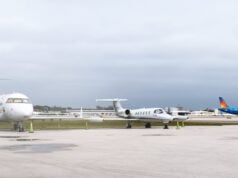New pilots who are committed to flying for major U.S. airlines will likely be drawn to airlines’ cadet programs. These programs are commonly found at regional airlines, including both independent and wholly owned carriers. Each of these programs has unique benefits, but it’s important to be aware of drawbacks as well. Know what you most need from a cadet program so you can select the right one for you.

Some cadet programs offer financial incentives. Programs might offer training reimbursements to help students offset their initial training costs before they’re airline-ready, and some might offer a stipend instead. A few cadet programs don’t offer financial incentives at all – or at least not direct incentives.
When considering cadet programs that do offer financial incentives, it’s critical to consider whether accepting this money comes with fine print. Many airlines will lock you into contracts to “pay back” the airline and may ask you to return the pro-rata share of a training grant if you leave the company before your contract has ended. Is this a risk you’ll be ready to take?
Perhaps it is best to go with a company whose cadet program has a contract if you already know you want to fly for this airline for the long term. Many American Airlines’ wholly owned regionals have contract-based cadet programs, so if American is your dream airline, perhaps these programs make sense. But if you aren’t sure or want to go a different route, perhaps you should consider cadet programs that don’t have financial incentives that will draw you into a contract.
Even if a cadet program doesn’t offer up-front financial incentives, there may be other benefits. Some may give you company seniority when you start the cadet program (instead of when you’d otherwise be hired as a pilot), allowing for benefits such as better insurance plans, more vacation time, and higher retirement matching, benefits more aligned with more experienced company employees. Some airlines offer early interviews or interview prep for their cadets to facilitate the transition to airline pilot.
Many pilots may also consider which aircraft they want to fly at the start of their airline careers. In the U.S., regional aircraft choices have become limited over time. But many pilots have compelling opinions and feel strongly about flying one type of aircraft or another. If this is your case, you might consider which airlines have the best options for upgrading to your preferred aircraft. Similar considerations should also be deliberated for your preferred bases.
In addition to personal benefits, also consider the operations of different airlines for which you’d like to be a cadet. Consider things like for which major airlines they fly. E.g., if you’re still on the fence about long-term career goals and want the added benefit of interacting with multiple mainline carriers, look for airlines that fit that requirement. Examine the quality of life at different airlines and consider which cadet programs are most worthy of your application time. Other practical issues, like commuting policies if you plan to live off base, are also important.
Fundamentally, choosing an airline cadet program to apply to includes a variety of factors. From financial and contractual obligations to other cadet benefits, consider which airlines you’d like to fly with for both short and long terms and whether applying to their cadet programs is worth your time and effort. Cadet programs can add significant value to your airline career, and as long as you know the details of specific programs and have considered your own values, the right choice may expedite propelling your career to the next level.























































































































